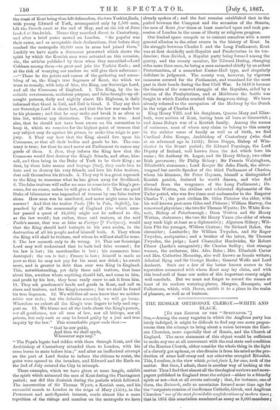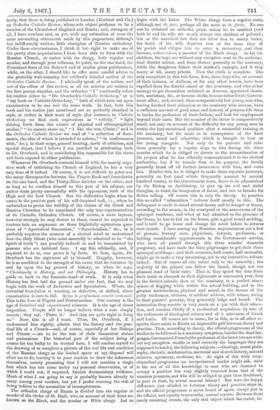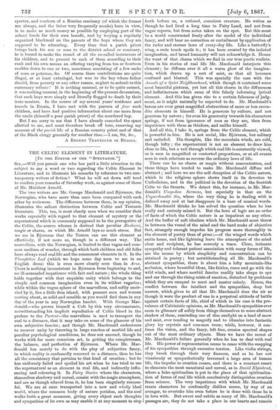THE RUSSIAN ORTHODOX CLERGY.—WHITE AND BLACK.
[To TUE EDITOR. OF THE " SPECTATOR. Sin,—Among the many vagaries in which the Anglican party has lately indulged, it might be difficult to find any one more prepos- terous than the attempt to bring about a union between the East- ern Churches, more especially that of Resale, and the Church of England. The mere statement of this object would be sufficient to make any one at all conversant with the real state and condition of the Russian Church, either consider the whole thing in the light of a cleverly got up hoax, or else dismiss it from his mind as the pro- duction of some half-crazy and not otherwise occupied Ritualist. This, I confess, is the view which prima facie I, for one, took of the matter. But then, I admit, there is another way of looking at the matter. Thus I find that almost all the theological reviews and news- papers published in England treat the subject—either in a friendly spirit or not—but at all events seriously ; that, for instance, one of them, the Bulwark, calls an association formed some time ago for the "corporate reunion of the Roman Catholic, Greek, and Anglican Churches " one of the most formidable confederations of modern times ; that in 1864 this association numbered as many as 8,000 members ; lastly, that there is being published in London (Triibne,r and Co.) an Orthodox Catholic Review, whose sole object professes to be a reunion of the Churches of England and Russia; and, strangest of all, I have nowhere met, as yet, with any refutation of even the most astounding statements made by this pugnacious, although but indifferently written, little champion of Russian orthodoxy. Under these circumstances, I think it but right to make use of the pretty close acquaintance r have been able to form with the Russian Church, or rather with its clergy, both regular and secular, and through your columns, to quiet, on the one hand, the Protestant fears of the Bulwark and of similar pions publications, while, on the other, I should like to offer some candid advice to the probably well-meaning but evidently deluded author of the Orthodox Catholic Review. I advisedly speak of the author, and not of the editor of this review, as all its articles are written in the first person singular, and the orthodox " I" continually refers his readers either to "Dr. Overbeck's Catholic Orthodoxy," or to " my book on 'Catholic Orthodoxy," both of which turn out upon examination to be one and the same work. In fact, both this book and the review just mentioned are so perfectly identical in style, or rather in their want of style (for instance, in Catholic Orthodoxy we find such expressions as " velleity," " light shining forth from the extent of physical and ethnographical studies," " he cannot atone us," " I like the true Christ ;" and in the Orthodox Catholic Review we read of " a collection of docu- ments, the idea of which is intended to relieve," "in conformance with," &e.), in their scope, general bearing, mode of criticism, and special object, that I believe I am justified in attributing both to Dr. Overbeck, and in considering him responsible for the views and facts exposed in either publication.
Whenever Dr. Overbeck contents himself with the merely nega- tive work of criticizing the Church of England, he has a very easy time of it indeed. Of course, it is not difficult to point out the many discrepancies between the Prayer Book and formularies on the one hand, and the Thirty-Nine Articles on the other, and as long as he confines himself to this part of his subject, our author deals pretty successfully with his opponents, both of the High and the Low Church. But his difficulties begin when he comes to the positive part of his sell-imposed task, i.e., when he undertakes to prove the validity of the claims of the Greek and Russian Churches to be considered the only true representatives of the Catholic Orthodox Church. Of course, a mere layman, however strongly he may demur to them, cannot be expected to venture into an argument on those frightfully mysterious ques- tions of " Apostolical Succession," " Sacerdotalisna," &c., as it probably requires the acumen of a clerical mind to understand how the Holy Ghost (who must assuredly be admitted to be " the Spirit of truth ") can possibly indwell in and be transmitted by persons who are habitual liars. I say this advisedly, and, if required to do so, can prove it by facts. So here, again, Dr. Overbeck has the argument all to himself. Happily, however, he is so confident in the strength of his cause, that he ventures by and by upon the lay ground of history, as when he says, "Christianity is History, and not Philosophy. History has to guide us back to the fountain-head of truth. It is only when History has first laid the ground under our feet, that we may begin with the work of Induction and Speculation. Where the historical foundation is wanting, or defective, or shifted, closer examination is sure to fail. Quant in profundum venerit contemn. This is the bane of Popery and Protestantism. Our century is the age of historical and experimental sciences. It is the age of closer inspection. People will no longer believe what a man simply asserts ; they say, ' Prove it.' And they are quite right in doing so." Now, this is all I want. Thus, Dr. Overbeck, if I understand him rightly, admits that the history and the prac- tical life of a Church—and, of course, especially of her Bishops and Priests — are to be the test of their theoretical claims and pretensions. The historical part of the subject being of course far too bulky to be treated here, I will confine myself to the drawing of as complete a picture of the real life and condition of the Russian clergy as the limited space at my disposal will allow me to do, leaving it to your readers to draw the inferences themselves, merely premising that I will not mention a single fact which has not come wider my personal observation, or of which I could not, if required, furnish documentary evidence. Much of what I am going to say is probably known already to many among your readers, but yet I prefer running the risk of being tedious to the accusation of incompleteness.
The orthodox clergy of Russia is divided into the regular or monks of the Order of St. Basil, who on account of their dress are known as the Black, and the secular or White clergy. Let us begin with the latter. The White clergy form a regular caste, although not de jure, perhaps all the more so de facto. No one can be ordained an orthodox priest unless he be married (and both he and his wife are nearly always the children of priests) ; but as the canonical law does not allow him to marry twice, the death of his wife deprives him at the same time of his parish and obliges him to enter a monastery, and thus become, nolens coleus, a member of the Black clergy. As for his children, the boys are without any exception sent to the ecclesias- tical district school, and from thence generally to the seminary, while the daughters follow their mother's example, and if they marry at all, marry priests. Thus the circle is complete. The only exceptions to this rule form, first, those boys who, on account of their laziness, or dullness, or for any other reason, have been expelled from the district school or the seminary, and who either manage to get themselves ordained as deacons, appointed choris- ters, sacristans, &c., or become clerks in some subordinate Govern- ment office ; and, second, those comparatively few young men who, having finished their education at the seminary with success, have a sufficient amount of good sense and honesty of purpose left them to loathe the profession of their fathers, and look for employment beyond their caste. But the number of the latter is comparatively small, not only on account of the difficulty for any young man to retain the just-mentioned qualities after a successful training at the seminary, but far more so in consequence of the hard pressure, moral and otherwise, which is brought to bear on the young renegade. Not only do his parents and rela- tions generally lay a regular siege to him during the three months which he is obliged to devote to the reconsideration of his project after he has officially communicated it to the clerical authorities, but if he remain firm to his purpose, the family generally break off all further intercourse with him, and curse him. Besides this, he is obliged to make three separate journeys, generally on foot (and which frequently amount to several hundred versts), to the Government town, there to be admonished by the Bishop or Archbishop, to give up his evil and sinful thoughts, to resist the temptation of Satan, and not to forsake his divine calling. Of course this is only the theory. In practice this so-called " admonition " reduces itself mostly to this. The delinquent is made to stand several hours, and to hunger or freeze, according to the season, in the courtyard or the ante-rooms of the episcopal residence, and when. at last admitted to the presence of his Grace, he has to fall on his knees, gets a good round scolding, and is told to go home and change his mind before he returns next month. I have among my Ruassian acquaintances not a few at present, literary men, physicians, lawyers, professors, or holding considerable appointments in the Government service, who have all passed through this three months' domestic purgatory, and have made the three pilgrimages to get their three episcopal moldings ; and their accounts, half comic, half mournful, might go to make a very interesting, not to say instructive volume indeed. But of course all this refers only to the minority ; the majority bf the priests' son follow the broad, though not too pleasant road of their caste. That is, they spend the time from their tenth or eleventh to their eighteenth or nineteenth year, first in the district schools, then at the seminary, in a perfect atmo- sphere of flogging while within the school-building, and in the greatest wretchedness, physical and moral, in the houses of the petty tradesmen, artizans, or soldiers' widows, with whom, owing to their parents' poverty, they generally lodge and board. The instruction they receive is very much on a par with their educa- tion, and consists chiefly of a mechanical acquisition by rote of the rudiments of theological science and of a minimum of Greek and Latin. Of course not in name, for in this, as in all other re- spects, there exists in Russia an impassable gulf between theory and practice. Thus, according to theory, the official programme of the studies to be followed in a seminary comprises, besides the dead lan- guages, German and French (the professors of the latter two are with- out any exception unable to read correctly the languages they are supposed to teach), the following subjects :—theology, moral philo- sophy, rhetoric, mathematics, universal and church history, natural sciences, agronomy, medicine, &c. At sight of this truly ency- clopsadical programme an inexperienced reader might ask, what is the use of all this knowledge to men who are destined to occupy a position but very slightly removed from that of the common peasants, and who will be obliged to gain their livelihood, in part at least, by actual manual labour ? But here the happy difference just alluded to between theory and practice steps in, and the official programme is never heard of again, except just in the official, and equally trustworthy, annual reports. Between these rarely recurring events, the only real object which the rector, in-
spector, and teachers of a Russian seminary (of which the former are always, and the latter very frequently monks) have in view, is to make as much money as possible by employing part of the school funds for their own benefit, and by levying a regularly organized blackmail on the parents of the boys whom they are supposed to be educating. Every time that a parish priest brings back his son or sons to the district school or seminary, he is bound to make the round of all the so-called instructors of his children, and to present to each of them according to their rank and his own means an offering varying from ten or fourteen roubles down to one or two, sometimes consisting of a few sacks of corn or potatoes, &c. Of course these contributions are quite illegal, or at least extralegal, but woe to the boy whose father should, from poverty or any other reason, neglect to submit to this customary tribute ! It is nothing unusual, or to be quite correct, it was nothing unusual, in the beginning of the present decennium, that such boys were simply and literally flogged to death by their irate masters. In the course of my several years' residence and travels in Russia, I have met with the parents of four such children, and have had positive information about one more from the uncle (himself a poor parish priest) of the murdered boy.
But I am sorry to see that I have already exceeded the space allotted to me, and must therefore break off here, reserving my account of the parish life of a Russian country priest and of that of the Black clergy generally for another time.—I am, Sir, &c.,
A RECENT TRAVELLER IN RUSSIA.
































 Previous page
Previous page